Maximizing American Airlines’ Award Routing Rules
Update: Some offers mentioned below are no longer available. View the current offers here.
With the exception of adding new premium economy awards to its charts, the American Airlines AAdvantage mileage program has only made relatively minor changes recently. This means that there are many ways to maximize your award tickets in the program, but to do so, you must know the ins and outs of what is (and isn't) allowed when you go to redeem your miles.
With that in mind, this guide will walk you through how to maximize the AAdvantage program's award routing rules. Below, you'll find information on American's award charts for its own flights versus those on partner airlines, a rundown of the fees associated with award tickets, and some hard-and-fast rules on the types of awards you can (and cannot) book using AAdvantage miles.
[table-of-contents /]
Please note that some of what follows isn't made public by American and is thus pulled from various online sources and reports. We can vouch for the accuracy at the time of writing, but be sure to do your due diligence before trying to book your own AAdvantage award ticket.
Fees
People often talk about award tickets as "free." In reality, there are usually plenty of associated costs with booking, changing or canceling an award. You can visit this page for details on American's applicable fees, but here are the important ones to keep in mind:
Award ticketing service charge: If you call in to book an award that you could otherwise book online, you will be charged $30 for travel within the US and $40 for international travel. This fee is waived for Executive Platinum elites, and if you can't (for any reason) book the award ticket using AA.com, you should be able to get it waived as well.
Close-in booking fee: This is a $75 ticketing fee when you book an award fewer than 21 days prior to departure. Luckily, it is waived for all AAdvantage elite members using miles from their own account. This fee (and waiver) also applies to changes to your outbound travel date that result in a departure within 21 days. If you're just changing the dates of your trip and it doesn't fall within the 21-day window, you don't have to pay this fee.
Changes to origin or destination: If you want to make changes to your itinerary, it'll cost you $150. This one is only waived for Executive Platinum members using miles from their own account.

Reinstatement charge: This is another one from which only Executive Platinums are exempt. It's $150 to cancel a reservation and reinstate miles for the first ticket and $25 for additional awards reinstated to the same account at the same time.
Taxes, fees and surcharges: The final added cost of award travel is the set of government-imposed taxes as well as carrier-imposed surcharges to tickets. In many cases, this is a negligible amount (like the $5.60 per person tax for most one-way award tickets that originate in the US). However, many countries will impose departure or arrival taxes, and some airlines are notorious for the surcharges they add to award bookings. Most AAdvantage award tickets won't incur the latter of these items, but any taxes or fees that a government requires typically must be paid when you redeem your AA miles.
Airline Partners

American is a member of Oneworld, which includes the following partners:
- British Airways
- Cathay Pacific
- Finnair
- Iberia
- Japan Airlines (JAL)
- LATAM
- Malaysia Airlines
- Qantas
- Qatar Airways
- Royal Jordanian
- S7 Airlines
- SriLankan Airlines
The airline also has the following individual non-alliance partners:
- Air Tahiti Nui
- Alaska Airlines
- Cape Air
- Etihad
- Fiji Airways
- Gulf Air
- Hawaiian Airlines (not to/from the mainland US)
- Interjet
- Jet Airways
- Seaborne Airlines
- WestJet
To take this one step further, here are the partners on which you can currently book awards online using AA.com:
- Air Tahiti Nui
- Alaska Airlines
- American Airlines
- British Airways
- Fiji Airways
- Finnair
- Hawaiian Airlines
- Iberia
- Malaysia Airlines
- Qantas Airways
- Qatar Airways
- Royal Jordanian Airlines
- SriLankan Airlines
You can also use the American app to book awards; the tool will typically show the same inventory as you'll find on AA.com.
Award Charts
Here are links to American's award chart for its own flights and those of its Oneworld and other partner flights.
For the sake of having all the numbers in one place, here is the AAdvantage chart for flights on American Airlines itself traveling to/from the Contiguous 48 US States in economy (Main Cabin).
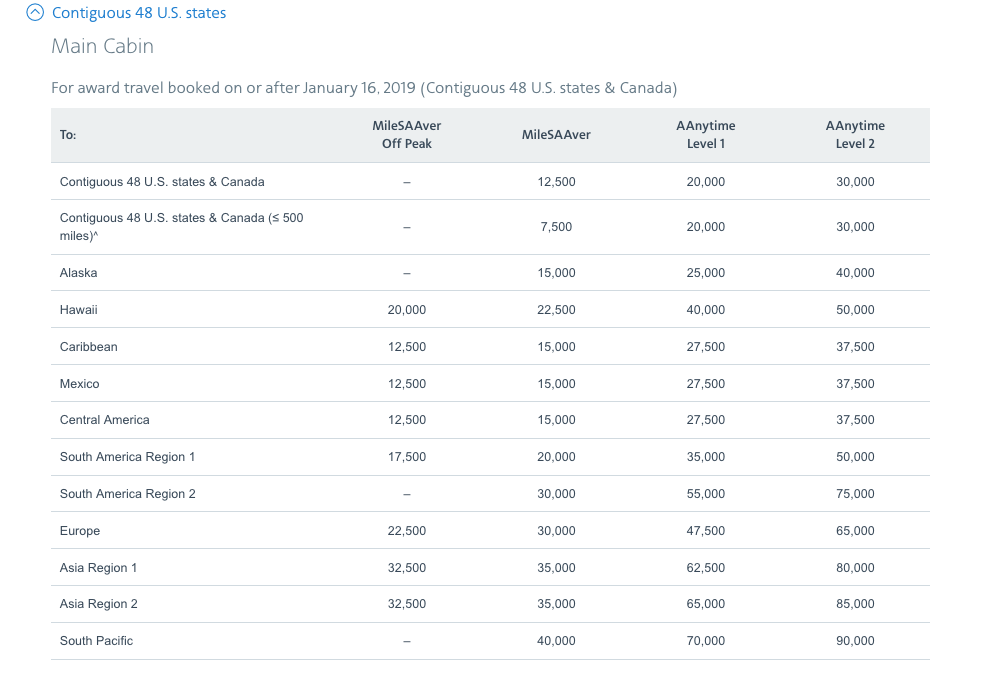
As you can see, there are several levels for each region depending on award availability and peak versus off-peak seasons. Here's the new premium-economy award chart for American-operated flights.
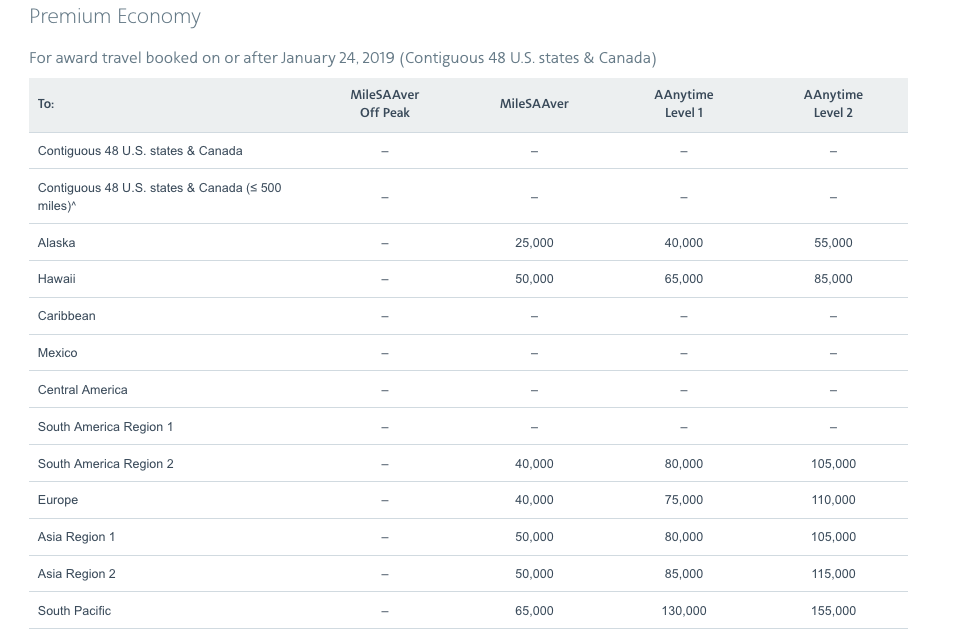
This is the chart for American's own flights in business and first class.
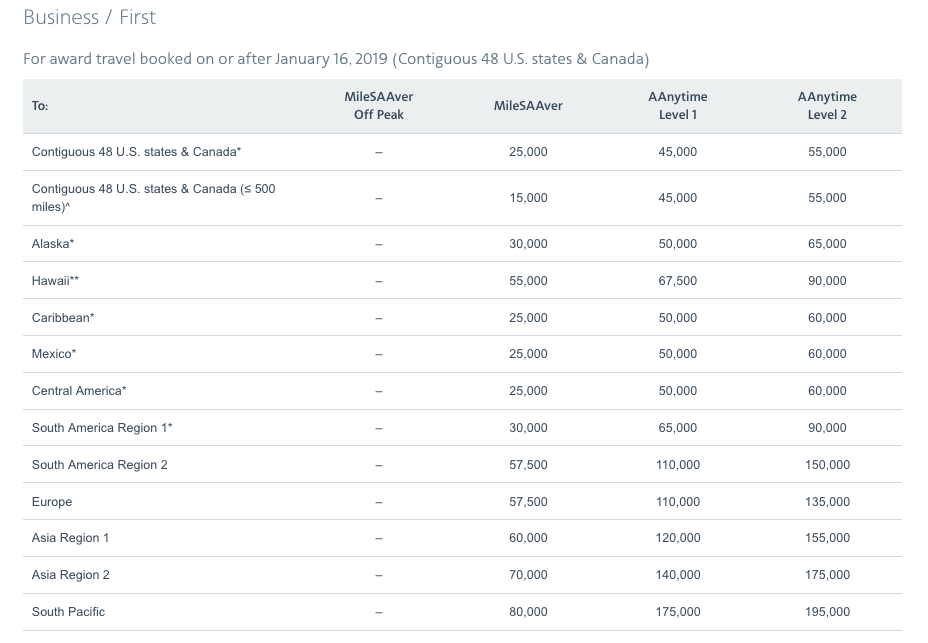
And finally, here is the chart for using American miles on its partners.

While these are relatively straight-forward, it's worth pointing out a few unique award options within the AAdvantage program's award charts.
7,500-Mile Awards
American Airlines instituted 7,500-mile awards in 2016 for one-way, nonstop award flights that are under 500 miles in distance. That saves flyers 5,000 miles over previous levels, which were 12,500 each way on short-hauls such as from Charlotte (CLT) to Asheville (AVL) or Los Angeles (LAX) to San Francisco (SFO). These prices will automatically appear online when you search for awards between applicable cities, though note that they are only valid on nonstop flights.
Off-Peak Awards
American also offers cheaper off-peak awards for economy travel to certain regions at certain times of year. Here are the regions to which they apply (dates are for 2019).
- Hawaii: 20,000 miles (to Hawaii: December 29 - March 12, August 11 - November 18, November 24 - December 10; from Hawaii: January 7 - March 19, August 18 - November 27, December 3 - December 25)
- Caribbean, Mexico and Central America: 12,500 miles (September 7 - November 14, April 27 - May 20)
- South America 1: 17,500 miles (January 16 - June 14, September 7 - November 14)
- Europe: 22,500 miles (January 10 - March 14, November 1 - December 14)
- Asia 1: 32,500 miles (to Japan/Korea: January 1 - April 30, July 1 - November 30; from Japan: January 16 - April 19, May 2 - 31, September 1 - December 31; from Korea: January 16 - May 31, September 1 - December 31)
- Asia 2: 32,500 miles (to China/Hong Kong: January 1 - April 30, July 1 - September 30, October 11 - November 30; from China/Hong Kong: February 1 - May 31, September 1 - 19, October 2 - December 31)
Though the dates can be hard to keep in mind, it's worth doing so, as you can save thousands of miles on an off-peak itinerary if your dates are flexible. Like the 7,500-mile awards, this pricing will automatically be reflected in the online search results.
Reduced-Price Awards
A final (and unique) feature of the AAdvantage program is the reduced-mileage awards it offers to holders of Citi and Barclaycard products like the Citi® / AAdvantage® Executive World Elite Mastercard® or the Citi® / AAdvantage® Platinum Select® World Elite Mastercard®. These awards are discounted 1,000 - 7,500 miles round-trip under the usual requirements, though the cities to which they are applicable change every month. However, these awards must be booked over the phone, as you won't see them reflected online. For full details on the current cities and how to book, check out this article. The information for the Citi AAdvantage Platinum card has been collected independently by The Points Guy. The card details on this page have not been reviewed or provided by the card issuer.
Region Definitions
In order to know how many miles you'll need for each award, you've got to know which countries fall into which region, especially as several continents are split up into multiple regions. Here's the current breakdown.
| REGION | COUNTRIES |
|---|---|
Contiguous 48 US States | United States |
Canada/Alaska | Alaska, Canada |
Hawaii | Hawaii |
Central America | Belize, Costa Rica, El Salvador, Guatemala, Honduras, Nicaragua, Panama |
Caribbean | Anguilla, Antigua & Barbuda, Aruba, Bahamas, Barbados, Bermuda, British Virgin Islands, Cayman Islands, Curaçao, Dominica, Dominican Republic, Grenada, Guadeloupe, Haiti, Jamaica, Martinique, Puerto Rico, St. Kitts/Nevis, St. Lucia, St. Maarten, Trinidad/Tobago, Turks/Caicos, US Virgin Islands |
South America 1 | Bolivia, Colombia, Ecuador, Manaus (Brazil), Peru |
South America 2 | Argentina, Brazil (excl. Manaus), Chile (excl. Easter Island), Falkland Islands, Paraguay, Uruguay, Venezuela |
Europe | Albania, Armenia, Austria, Azerbaijan, Belarus, Belgium, Bulgaria, Canary Islands, Croatia, Cyprus, Czech Republic, Denmark, Estonia, Finland, France, Georgia, Germany, Gibraltar, Greece, Hungary, Iceland, Ireland, Italy, Latvia, Lithuania, Luxembourg, Macedonia, Malta, Moldova, Montenegro, Netherlands, Norway, Poland, Portugal, Romania, Russia, Serbia, Slovenia, Spain, Sweden, Switzerland, Turkey, Ukraine, United Kingdom |
Middle East | Bahrain, Egypt, Iran, Iraq, Israel, Jordan, Kuwait, Lebanon, Oman, Qatar, Saudi Arabia, United Arab Emirates |
Indian Subcontinent | Bangladesh, India, Kazakhstan, Maldives, Nepal, Pakistan, Sri Lanka, Turkmenistan, Uzbekistan |
Africa | Algeria, Angola, Djibouti, Equatorial Guinea, Eritrea, Ethiopia, Ghana, Kenya, Mauritius, Melilla, Morocco, Mozambique, Namibia, Nigeria, Rwanda, Senegal, Seychelles, South Africa, Sudan, Tanzania, Tunisia, Uganda, Zambia, Zimbabwe |
Asia 1 | Japan, Korea |
Asia 2 | Brunei, Cambodia, China, Hong Kong, Indonesia, Malaysia, Myanmar, Philippines, Singapore, Taiwan, Thailand, Vietnam |
South Pacific | Australia, Easter Island, Fiji, French Polynesia, Guam, Kiribati, New Zealand, Papua New Guinea, Palau, New Caledonia, Republic of Tonga, Republic of Vanuatu, American Samoa and Samoa, Solomon Islands, Tuvalu |
This becomes especially important for two main reasons. First, the above award charts tend to price award tickets differently across regions, and in some cases, the differences can be quite large. For example, a partner award in first class from the contiguous US to Japan is 80,000 miles each way. Booking a flight from the US to China in first class would require 110,000 miles, a premium of nearly 30%!
Second, these region definitions play a large role in determining what you're allowed to do when redeeming your AAdvantage miles.
One-Ways, Open Jaws and Stopovers
One of the most popular ways to extend the value of your miles is by booking one-way itineraries, open jaw tickets and stopovers on redemptions. It's critical to understand how American treats these different types of awards, but first, let's define a few of these terms. An open jaw is when you fly from one city to another, then resume travel in a third city back to either your origin or another city in your origin region (like two one-ways). A simple example is flying from New York-JFK to London-Heathrow and then flying back from Paris (CDG) to New York-JFK. The so-called "open jaw" is created between London-Heathrow and Paris.
Meanwhile, a stopover is when you have an extended stop en route from your origin to your destination (or vice versa). This is different from a simple connection in that you're spending extra time in the connecting city rather than just going from your arrival gate to the departure gate of your connecting flight. Generally speaking, a layover becomes a stopover when it's longer than four hours in a domestic US city or over 24 hours internationally.
The bad news is, American Airlines typically does not allow stopovers or open jaws on award tickets. However, you can book one-way awards using AAdvantage miles, so essentially, you can have the equivalent of an open jaw.
In addition, American will sometimes allow you to book a longer connection within the US but charge the same number of miles, as TPG Editor Nick Ewen discovered when researching how the carrier continues to make it harder to redeem your miles. In certain cases, he found that the carrier was essentially forcing flyers into longer layovers, though the award prices remained the same.
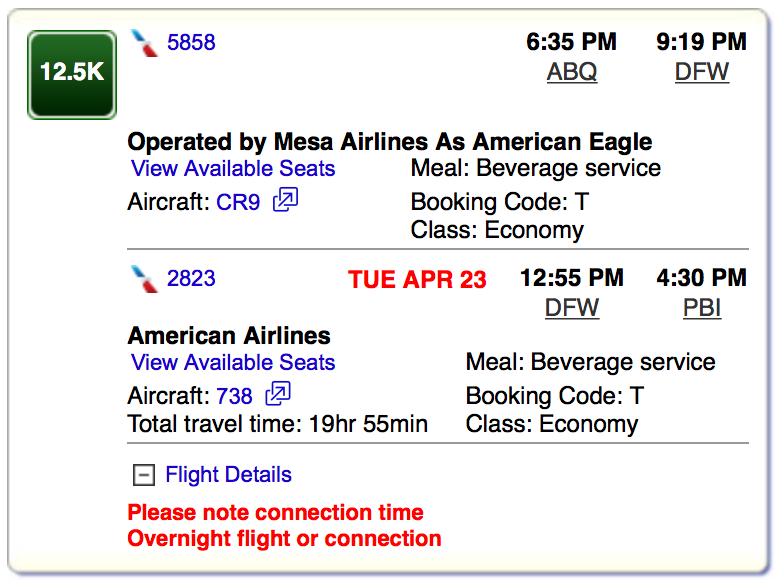
These are likely more the exception than the rule, so I wouldn't count on them as you're planning your award travel.
Routing Rules
Like many other carriers, American Airlines does not publish a comprehensive list of award routing rules. Rather, we must rely on anecdotal data points compiled and shared by other flyers over the years as well as some announcements by the individual airlines to piece together the kinds of awards you can (and cannot) book using AAdvantage miles.
Some of the rules of thumb are fairly obvious, though. The AAdvantage search engine and rules are meant to encourage travelers to book the most direct and fastest routings between origins and destinations, though it will price out awards that prioritize consistency of booking class over directness. So, if you're looking for an award from Los Angeles (LAX) to London-Heathrow (LHR), you might find nonstops available in economy, but then AA.com may price out business class awards with a connection, like New York-JFK or Philadelphia (PHL). On the other hand, you can't book an award from London to New York via Los Angeles since that is so far out of the way. This is a sort of "common sense" rule.
However, there are several other more nuanced rules that you must follow when you redeem your AAdvantage miles.
Third-Region Transit
One complicating factor is American's so-called "third-region rule." The gist sounds simple enough: when booking an award from one region to another, you generally cannot transit through a third region. For example, if you wanted to fly from the US to Europe, you could not expect to do so via South America. If you tried to do that, American would charge you the mileage for two separate awards.
However, there are notable exceptions to this rule, most of which involve logical routings on which you can typically find published fares. Here's what we know about them.
| ORIGIN | DESTINATION | THIRD REGION |
|---|---|---|
North America | Middle East | Europe |
North America | Indian Subcontinent | Europe, or Hong Kong (HKG) on Cathay Pacific |
North America | Africa | Europe, or Doha (DOH) on Qatar Airways |
North America | Asia 2 | Asia 1 |
Central America, South America 1 and 2 | Africa, Middle East, Indian Subcontinent | Europe |
South America 2 | Africa | Doha on Qatar Airways |
Europe | Asia 1 | Asia 2, or Doha on Qatar Airways |
Europe | Asia 2 | Doha on Qatar Airways |
Europe | Australia | Doha on Qatar Airways |
Europe | South Pacific | Asia 1, Asia 2, Doha on Qatar Airways, or Dubai (DXB) on Qantas |
Middle East/Indian Subcontinent | Asia 1 | Asia 2 |
Middle East/Indian Subcontinent | South Pacific | Asia 2 |
Africa | Asia 1 | Asia 2, or Doha on Qatar Airways |
Africa | Asia 2 | Doha on Qatar Airways |
Asia 1 | South Pacific | Asia 2 |
That's a lot of regions to keep track of, so don't worry about having them all in mind. Rather, figure out where you're traveling to/from, and then keep this post on hand to understand whether awards you want to book are even possible. After all, you don't want to keep searching for an award from the US to Australia hoping that AAdvantage will let you route through Hong Kong, only to keep coming up empty-handed.
Here are several other rules worth noting:
- When traveling between two cities in the US, you cannot route through Canada or Mexico.
- When traveling between cities within either Canada or Mexico, you cannot route via the US.
- Travel from North America to Europe, Africa and the Middle East must route via the Atlantic. You could fly from Los Angeles to London-Heathrow to Johannesburg (JNB), but you couldn't fly from Los Angeles to Hong Kong to Johannesburg instead.
- Travel from North America to Asia and the South Pacific must route via the Pacific. You couldn't fly from New York-JFK to London-Heathrow to Hong Kong on a single award.
- Travel to/from Tahiti and Fiji cannot route via Australia or New Zealand.
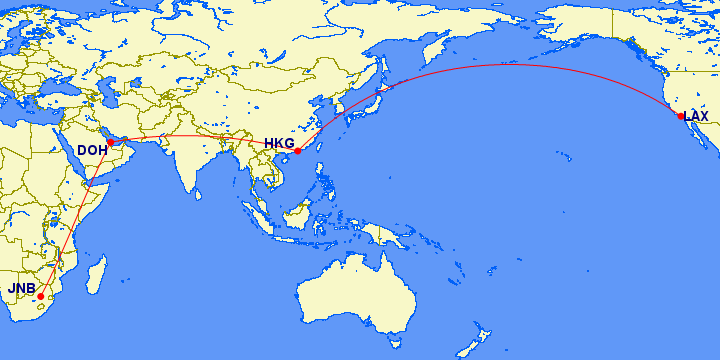
Maximum Permitted Mileage
One of the other most arcane aspects of the award routing rules is the concept of "maximum permitted mileage." The term refers to the distance airlines calculate between city pairs and is determined by the International Air Transit Association (IATA). What makes this strange is that the MPM is not the actual distance between city pairs, but a number that instead includes the possibility of connecting flights, which puts it at around 10% more miles than direct service in most cases. For award tickets, AAdvantage will let you book trips that are up to 25% longer than the MPM of your origin/destination combination. Yes, it's complicated, but for most flyers it makes sense.
The IATA does not publish MPM numbers for routes online, but you can look them up with a paid subscription to ExpertFlyer. To see the MPM for a route you're interested in, log into your ExpertFlyer account and go to the Travel Information tab on the left-hand side. Then select Maximum Permitted Mileage. Enter your city pairs and airline, and the search will generate the MPM for you.
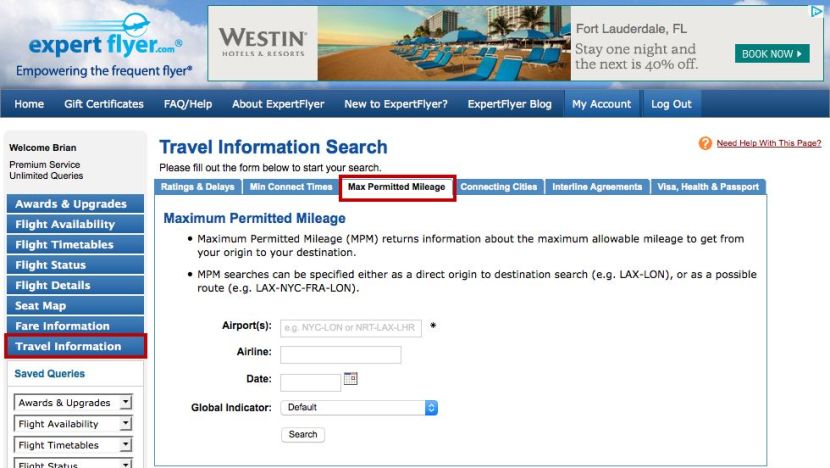
In this example, I looked up MPM from New York-JFK to New Delhi (DEL). As you can see, it pulled up the MPM via both the Atlantic (AT) and Pacific (PA), which is great because American allows you to transit via Europe or Hong Kong now.
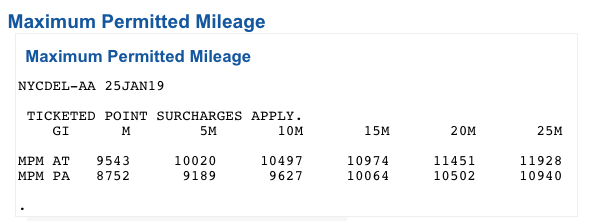
Via the Atlantic, the MPM plus 25% is 11,928 miles. So flying from New York-JFK to London-Heathrow to New Delhi would definitely work since that route would be just 7,641 miles.
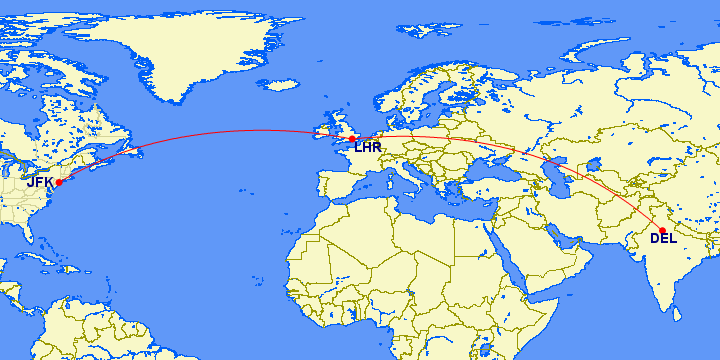
Via the Pacific, the MPM plus 25% is 10,940 miles (lower than via the Atlantic). Getting there via Hong Kong would be no problem, though, at just 10,403 miles.
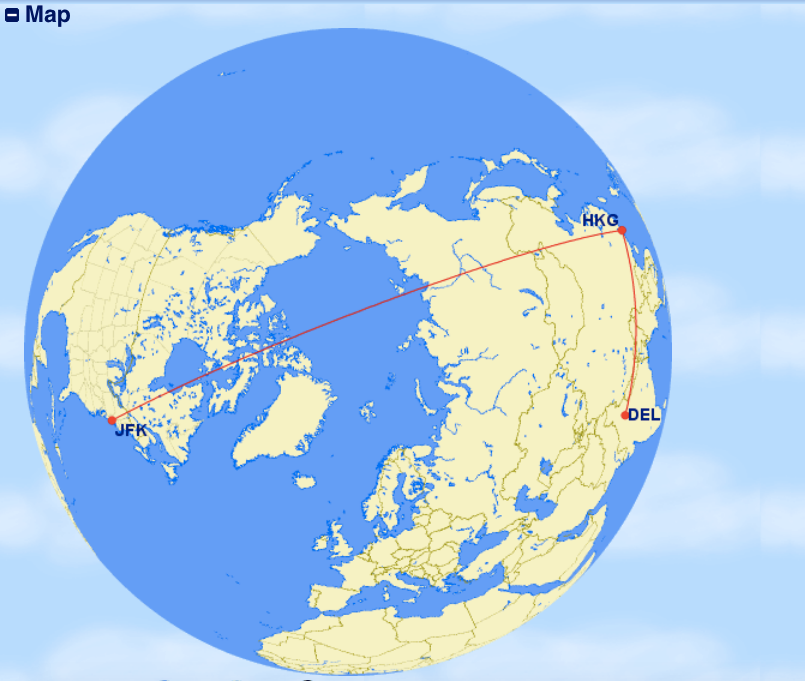
Now, you might want to transit via Tokyo (NRT) instead to fly Japan Airlines.
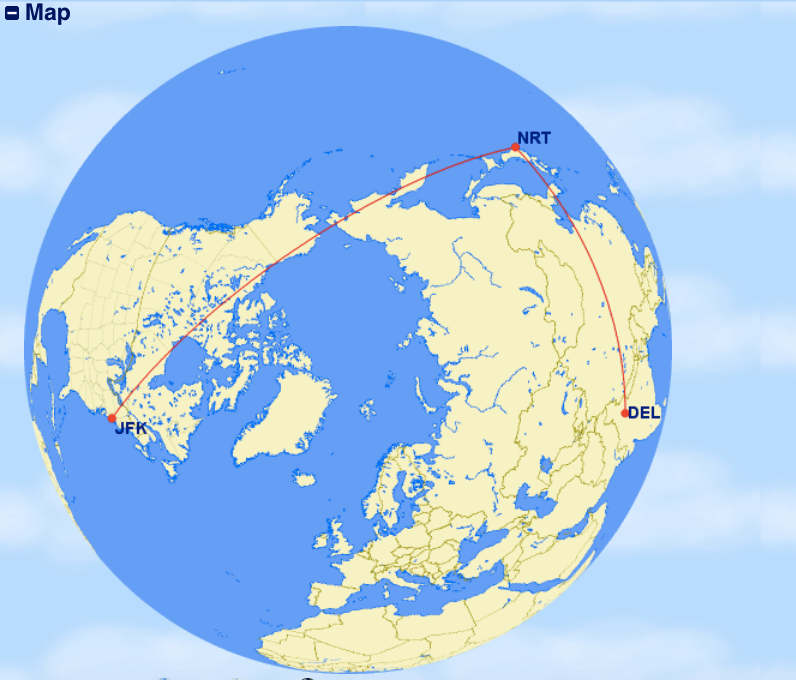
The mileage works, clocking in at just 10,423 miles. Remember, though, you can't transit from North America to India via Asia 1, which includes Japan. Even though the itinerary does satisfy the MPM rule, it violates American's third-region transit rule, so this is an illegal routing for a single award ticket through the AAdvantage program.
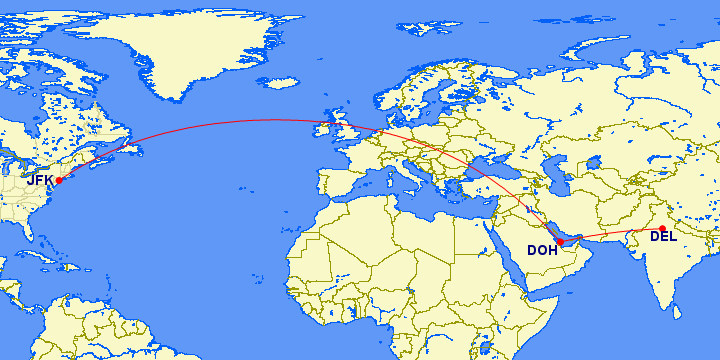
Another example of this would be transiting via Doha on Qatar Airways. Once again, you'd be violating the third-region rule, even though it falls within the route's MPM.
Not to end on a negative note, though...because of American's one-way award possibilities, you could maximize this trip in other ways, despite the limitations. For instance, you could fly from New York to New Delhi via Hong Kong on Cathay Pacific. Then book a separate one-way as your return via London on British Airways, or Helsinki on Finnair, just to get to try a couple different carriers since both Hong Kong and Europe are permitted as third-region transit exceptions between the Continental US and India.
Published Fares
Now for another esoteric consideration: any award you hope to book must be on a route where the transoceanic carrier publishes a fare. Just because tickets between certain cities don't show up on search engines does not mean there is not a published fare on that route. Rather, airlines have lists of published fares between city pairs that should be available for purchase by anyone. But to make things easier, log back into ExpertFlyer. Then use the Fare Information option to search city pairs and airlines for the dates you're curious about.
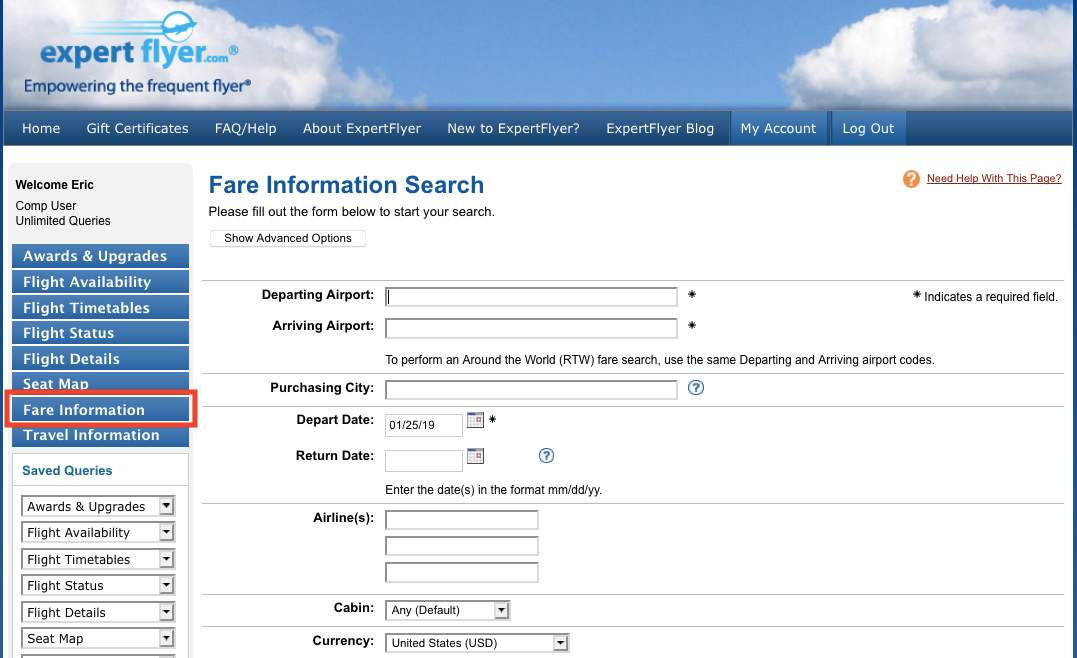
As an example, let's say you wanted to use your miles to fly to Asia and visit Angkor Wat in Cambodia. I put in a search example of Omaha (OMA) to Siem Ream (REP), with Cathay Pacific as the carrier.
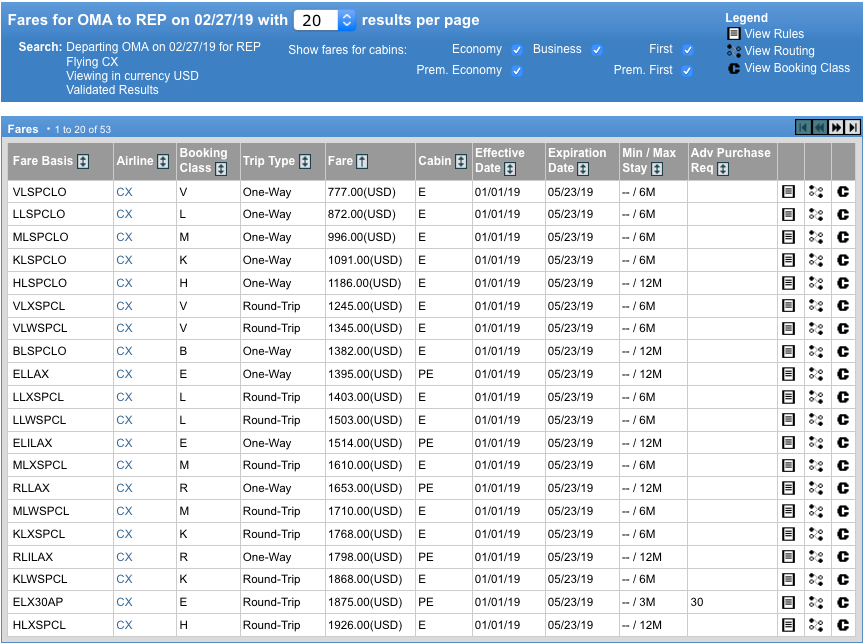
Funnily enough, Cathay Pacific publishes fares between those two cities. You can even see fares by booking class, the effective and expiration dates, minimum/maximum-stay requirements and more. Since there is a published fare, you could book this as an award...depending on availability, of course.
Bottom Line
Clearly there is a lot to keep in mind when it comes to booking awards using American Airlines AAdvantage miles. Depending on your elite status, there are fees to consider. The third-region rule and its exceptions can also either limit or maximize your routing possibilities, depending on how you leverage them.
Though you can get creative with routing and one-ways in order to stretch your miles further and try out interesting onboard products like Qatar Airways' QSuites, you must also remember the transit and maximum-permitted-mileage rules to avoid searching for impossible-to-book awards in vain. With a little planning and strategy, however, the sky is the limit.
Be sure to share any questions or tips on booking American Airlines awards in the comments below!

